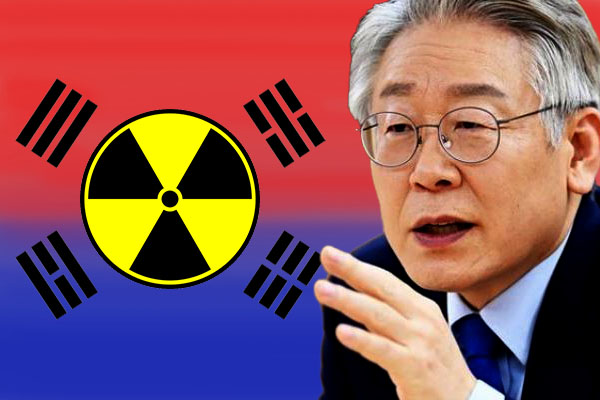As South Korean conservative presidential candidates suggest that it is time to introduce a nuclear sharing agreement like NATO in Northeast Asia, populist Gyeonggi Governor Lee Jae-myung, a leading leftist presidential hopeful, ironically attacked them for coming up with “populist national security policies.”
While discussing the nuclear sharing idea mentioned by conservative candidates, including Hong Joon-pyo, Yoo Seong-min, and Ahn Sang-soo, Lee said, “This is a dangerous argument.”
“I understand that this is election season, but it is an extremely dangerous populism aimed to get more votes by misusing the national security situation,” Lee said on Sunday. “It is neither desirable nor realistic. It rolls back our efforts on denuclearization of the Korean Peninsula, which was continuously pursued since the Roh Tae-woo administration, to nothing. It makes us lose our reasoning to ask North Korea to denuclearize.”
He continued, “The redeployment of tactical nuclear weapons to the Korean Peninsula would cause strong retaliation and serious diplomatic conflict with neighboring states. There is no chance that the United States would accept this request, and the Biden administration, which pursues a nonproliferation policy, is obviously not going to accept this, unlike the Trump administration.”
Lee Jae-myung, who is leading all his rivals from the ruling Democratic Party (DP) in the public opinion polls, is often referred to as “Korea’s Bernie Sanders.” He has already announced various domestic policies that are often considered populist, including universal basic income, public housing for 1 million households, and providing money to every female teenager aged between 11 and 18 to buy sanitary pads. Both conservative politicians and his rivals in the DP criticized him for his unrealistic, populist policies. In an apparent counterattack to his political enemies, he appears trying to frame others as a different kind of populist.
Lee also argued that the main opposition People Power Party (PPP) should clearly state whether they are on the side of peace on the Korean Peninsula or war on the peninsula. He added that efforts to achieve denuclearization of the peninsula continued even during conservative administrations and that he will not let the Korean Peninsula again become a venue for a global arms race.
Hong Joon-pyo, a lawmaker from the PPP who lost to Moon Jae-in in the 2017 presidential election, responded to Lee’s comments by saying, “It is absurd that a typical populist, who does not have any knowledge of national security and diplomatic issues, is saying such things about populism related to national security.”
“Does he know the background of the redeployment of tactical nuclear weapons in five NATO countries in Europe?” he asked. He mentioned the fact that during the Cold War, Germany took a tough stance with the United States, insisting they would have to develop their own nuclear weapons if the U.S. failed to deploy tactical nuclear weapons due to threats coming from the Soviet Union. “The United States deployed tactical nuclear weapons to Germany, Belgium, Italy and Turkey and signed a nuclear sharing agreement with them. This established a new nuclear balance in the front line and led to the withdrawal of a significant number of Soviet nuclear missiles in the region.”
Hong added, “Everyone with enough knowledge knows that the North Korean nuclear threat is more serious than the threat that NATO faces, but it appears that pro-North Korean candidate Lee Jae-myung is the only one who does not understand this. Please study more. You have to know something at least to become the head of a rural county or something.”
Yoo Seong-min, another candidate who ran in the 2017 election from a minor conservative party, asked, “Is he saying this is populism? He needs to look back on his series of populist policies.” Yoo, who is considered a more moderate conservative, asked Lee for an alternative to solve the North Korean nuclear issue. “Lee needs to clearly state how to remove North Korean nuclear missiles without having to acquire nuclear deterrence capability.”
“Does he really believe that North Korea would never use nuclear weapons against South Korea because we share the same blood?” he asked. “Does he really have the naive thinking that North Korea will voluntarily dismantle their nuclear missiles if we ask them nicely? I hope he is not buying into North Korea’s unification strategy under communism by using the nuclear attack.”
Conservative politicians are being more cautious about the argument that South Korea should develop its own nuclear weapons. However, they are being more publicly insistent on the need to have some level of nuclear capability to deter the North Korean threat, which includes the redeployment of U.S. tactical nuclear weapons or the signing of a nuclear sharing agreement with Washington.
On August 27, Hong said he will push ahead with introducing a NATO-style nuclear sharing program if he is elected in the next presidential election. “The North Korean regime would collapse right away after it abandons its nuclear weapons,” he argued. “The North Korean nuclear problem is not something that is solvable diplomatically. The only way to respond to it is through [our own kind of] nuclear [weapons].”
In July, Yoo Seong-min said he had promised to introduce the nuclear sharing agreement in the 2017 presidential election and believes it is necessary. “If South Korea and the United States sign an agreement to share nuclear weapons, it would make the U.S. nuclear capability a mutual asset between the two countries,” he said. “This will be the biggest and most effective deterrent against North Korean nuclear weapons. It will be a game changer.”


